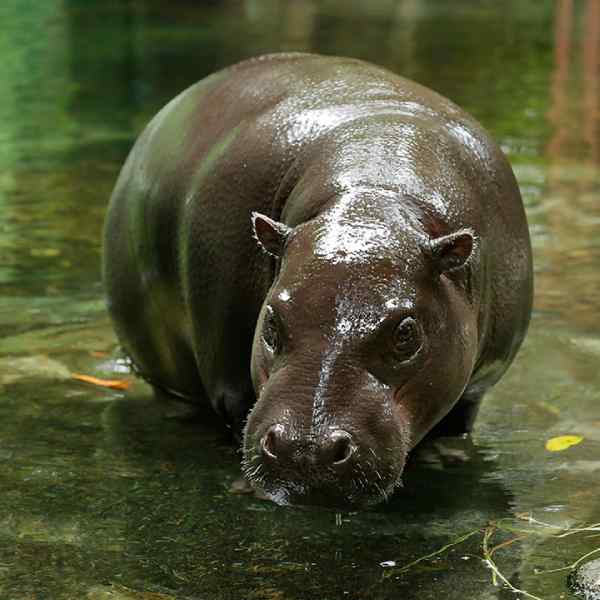What sound does a hippo make? It’s a question that has long intrigued researchers and casual observers alike. Hippos are unique among animals in their ability to produce a wide range of sounds, both underwater and on land. While the exact meaning of all these vocalizations is still not fully understood, they provide an important window into the inner lives of these fascinating creatures.
Table of Contents
Most of the sounds made by hippos are designed for long-distance communication. Underwater, their low-frequency grunts and growls can travel for considerable distances. On land, their loud wheezing noises serve the same purpose. But Hippos also make more gentle sounds, such as soft squeaks and croaks, which are thought to be used for close-range communication between individuals.
Whatever the specific meaning of each sound, it is clear that hippos use vocalizations to communicate with each other in a variety of ways.

Kinds of Sounds Hippos Make
What sound does a hippo make? Hippopotamuses spend the majority of their lives in the water, despite the fact that they are only considered to be semi-aquatic creatures. In point of fact, eighty percent of their communication takes place below the surface. Hippopotamuses typically communicate with one another by making a number of different sounds, such as honking, chuffing, and a low-pitched chuckling.
It’s possible that the sound of a dolphin and the noise made by hippos share some similarities under certain circumstances. People are fascinated by hippopotamus and their unusual lifestyle, therefore they want to know what noises they make when they are submerged in water.

Hippos, according to the findings of certain studies, are capable of making sounds that span a broad spectrum of frequencies, from deep rumbles to high-pitched squeals. These varied calls serve a variety of functions, including indicating danger, discouraging potential foes, and luring potential partners.
On the other hand, Hippos can communicate with one another simultaneously both below and above the water’s surface. A hippo uses its nostrils to make noises above the water’s surface, and its jawbones to reverberate the noises below the surface of the water. And certainly, this is one of the defining characteristics that set these African mammals apart from others.

Are hippos loud? Yes, hippos can create 115-decibel sounds. These sounds are usually made when the animals are in musth, a periodic condition characterized by increased testosterone levels and aggressive behavior. However, hippos can also make other types of noises, including grunts, squeals, and even yells.
The dominant hippos will roar and honk to demonstrate their authority. Hippos produce extremely loud noises, which may be heard in the surrounding areas. This extremely loud noise can be heard even from one mile away, and the sound level can be compared as being similar to that of a rock concert.
On the other hand, some hippos are capable of making sounds known as infrasound, which have extremely low frequencies. Because it is below the threshold of human hearing, even people are unable to identify this sound.
While they are generating a fountain, the hippos make noises with a frequency that ranges from 10 to 20 Hz. The ‘bubble bursts’ created by a hippopotamus can also be found, which are quite comparable to those produced by a grey whale. Hippos will also engage in chain chorusing in order to promote communication over greater distances.
The territorial male hippopotamus will grunt, yell, and groan in order to stake his territory. When the male hippo honks to advertise that it is the leader of the group, other hippos in the same group look to their leader to receive warnings about any potential threats that may be on the horizon.
Hippos are also capable of making sounds similar to laughter, although the laughter of a hippopotamus can be quite deadly. Hippos are ferocious animals that are native to Africa. They pose a risk to human health, despite their gloomy appearance, which might fool people into thinking they are harmless.
How does a Hippo make a sound?
It is an interesting fact to take into consideration that sound waves are unable to travel through different media. For instance, when a hippopotamus is underwater and making sounds, the sounds travel through the nose to the air and also through the jawbones of the hippo while it is underwater.
This sound may be plainly heard above the water’s surface, but the hippos below the surface hear these sounds because the vibrations of the sound waves travel through their bodies. The hippo possesses a layer of fatty tissue near its neck that contributes to the production of sound vibrations when it is submerged in water.
Hippopotamuses are able to communicate with one another above the water’s surface as well as below it at the same time because of this behavior.

Why do Hippos Make Noise
Hippopotamuses are extremely social animals that like associating with other hippos. They appear to be very content at this time as evidenced by the fact that their lips are wide open emitting noises similar to yawning; nevertheless, these sounds are actually a warning indication.
In the event that there is a potential danger, the male hippos will often honk to alert the other hippos in the herd. In addition, honking is a typical form of communication used by hippos.
These honking sounds are also produced by the male hippos after they have mated with a female, and through these wheezy honking sounds, the male hippos are attempting to announce that they have mated.
The mating calls of male hippos are the audible signal used to entice female hippopotami. However, male hippos are the only ones that make these calls. Even while mating sounds may be broken down into two distinct categories—mechanical calls and vocalizations—hippopotamuses use a kind of vocalization that is entirely unique to the species when they are creating mating calls.
Fun facts about how hippo sounds
Hippopotamuses are one of the very few mammalian species that are capable of the distinctive vocalizations technique. Following are some points that contain a summary of some relevant information on hippopotamus sounds:
- They might give off the impression that they are in a good mood when you hear their honking sounds, and you might think that they are laughing when they produce such loud sounds, but in reality, they might become hostile at that time.
- The sounds that hippos make have both high and low frequencies, depending on the time of day. The frequency range of their grunting sounds will often be anywhere between 30 and 60 Hz.
- Low-frequency sounds may be 20 to 30 Hz.
- Hippopotami make sounds by air and water simultaneously.
- Male challenges in order to maintain their supremacy, and they must make loud honking sounds in order to alert other hippos to the location of their prime area.
FAQs
Do hippos grunt?
Yes, they do! And their grunts are one of the things that make them so unique.
They are also very vocal animals, and they are known for their distinctive grunts. In fact, hippos grunt so frequently that they have been nicknamed “river horses”.
Do hippos cry?
When the nictitating membrane is retracted, the tear ducts are exposed, allowing tears to flow. While it’s not clear why hippos cry, it is thought that tears may play a role in keeping their eyes clean and healthy.
Why do hippos honk?
This deep, guttural noise is used to warn other hippos of danger, establish dominance, and attract mates.
Final Words
The vocalizations of hippopotami have long mystified people. These African mammals are capable of making a wide range of sounds, from low grunts to high-pitched squeals. Some people find hippo sounds calming, while others find them unsettling. In any case, the voice of the hippopotamus is one of the most distinctive sounds in the animal kingdom. The ability to make such a variety of sounds is believed to be linked to the hippo’s large and complex vocal cords.
Read our other Hippo blogs below:
- Can Hippos Jump?AnimalsResearch.com
- What Color is a Hippo? Learn True Facts
- Do Hippos Live in Ocean? Is It True Or False
- What Is A Hippos Bite Force?
- Hippo Mouth: Size and Facts
- Hippo Pregnancy | How Long Does a Hippo Pregnancy Last?
A motivated philosophy graduate and student of wildlife conservation with a deep interest in human-wildlife relationships, including wildlife communication, environmental education, and conservation anthropology. Offers strong interpersonal, research, writing, and creativity skills.










